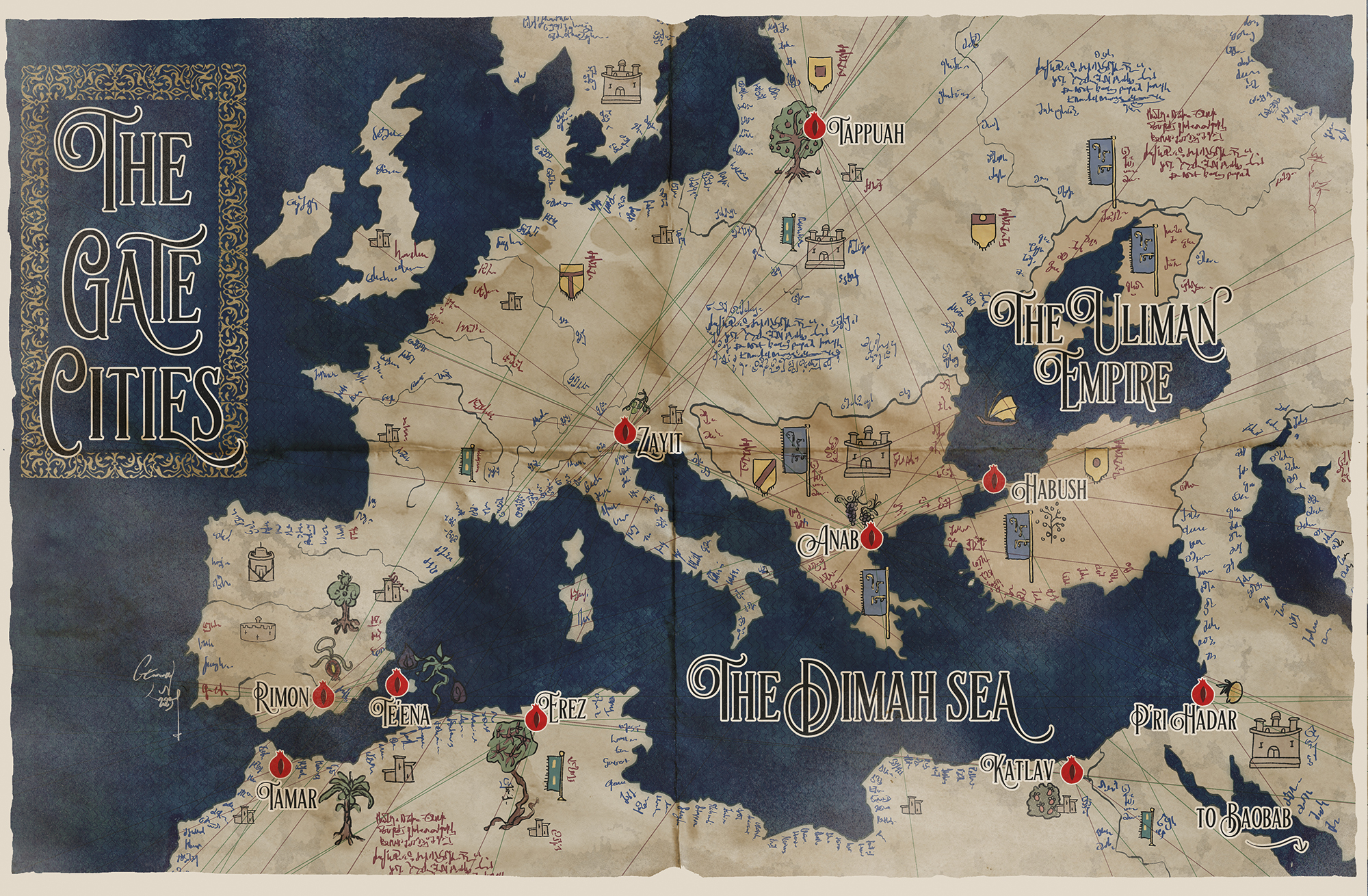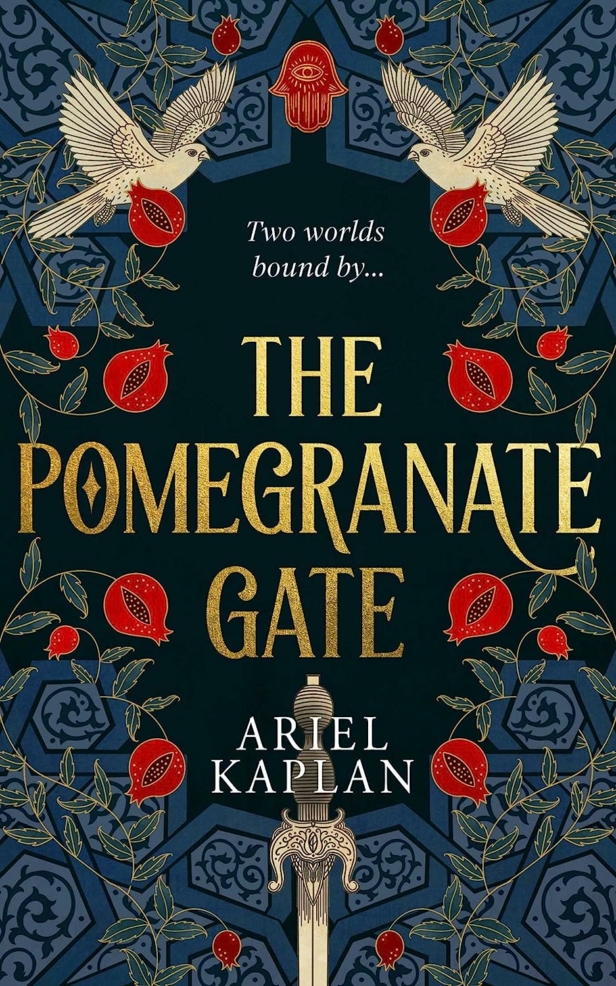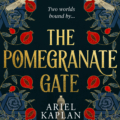The Pomegranate Gate, by Ariel Kaplan is a captivating fantasy novel steeped in Jewish folklore, set against the backdrop of the Spanish Inquisition.
In a tale of intertwined destinies, Toba Peres, is gifted with linguistic prowess and immerses herself in translating books while concealing her unconventional abilities. Meanwhile, Naftaly Cesques, burdened by his family’s tailoring legacy and plagued by enigmatic visions, embarks on a journey unknowingly entwined with Toba’s fate. As their shared community faces turmoil and persecution, Naftaly defies the Queen’s decree to expel Jews from Sefarad, their homeland, escaping with an enigmatic book, while Toba is drawn to a mysterious figure with piercing orange eyes…
In order to escape, Toba ventures through a pomegranate grove’s enigmatic portal, guided by the orange-eyed stranger where she enters an ancient realm entwined with her own. Here an age-old conflict threatens to shatter both worlds and determine the fate of her and Naftaly. Lost in separate realms, the interwoven perspectives add depth to this richly layered narrative, blending Jewish folklore with fantasy.
We sat down with the book’s author Ariel Kaplan to find out more…
When did you first get the idea for The Pomegranate Gate?
I’ve wanted to write a fantasy about Sephardi Spain for probably 20 years, and I had the idea for Toba’s part of the narrative several years ago. I realised pretty quickly that her story didn’t stand well on its own. It felt like half a novel, and it took me a long time to figure out what the other half needed to be. Once I had Naftaly, the story—well, it didn’t write itself, but the direction of it became clear.
How much research did you do before writing the novel?
That’s difficult to quantify—I have been reading Jewish folklore pretty intensively since I was young, but I spent several months before I started drafting The Pomegranate Gate going through and rereading the stories I knew I wanted to draw from (anything to do with the city of Luz, or the Ziz, or demons).
In terms of the historical aspects, I did a summer-long research project on Sephardi Spain back when I was at university, so that’s another long-standing interest. I did do a lot of refreshing my knowledge before I started writing— I still have all my old history books from that period, and I did a lot of additional reading to fill in the blanks for what I might have missed.
How would you describe the Maziks and their world?
The Maziks are immortal magic users who view themselves as extremely civilized. At the time of The Pomegranate Gate, they live in 11 cities, most of them Mediterranean-adjacent, each of which is cantered on a gate that opens to the mortal realm.
The world itself operates on a principle the Maziks call The Mirror, by which events in the mortal world are reflected in their own — sometimes disastrously. Whether the Mirror is something the Maziks can make use of, by influencing events in the mortal world, is an ongoing question.
The novel is incredibly expansive, and is set in two worlds – how did you go about creating the worlds in the novel?
I tried to keep Naftaly’s world in line with late-fifteenth century Spain so much as I could (though obviously, the geography and other details have been changed: this is a fantasy, not an historical novel).
Toba’s Mazik world sprang very much from that, except you have a king and an Inquisition who can use magic and who don’t regularly die. I had to ask a lot of questions as to what certain things would look like in a world in which regime change is unusual, because the same king might be running things for a thousand years or more, or what would a world look like where immortals are being threatened with death?

What was it like writing the story from two very different perspectives and did you prefer writing for Toba or Naftaly?
Writing in both perspectives allowed me to expand the story to include both worlds, but it did present some challenges when keeping the timeline straight when events happened in both of them, like a full moon.
As for which was easier, it actually had to do with who else was in the scene; anything with Barsilay, for example, was very enjoyable to write because it’s so much fun to write his dialogue.
The Maziks have a lot of incredible magic – if you could choose one piece of magic that the Maziks have, what would that be?
Immortality would seem to be a good choice. Apart from that, I would very much like to be able to make a shade to do all my chores.
What can you tell us about the book’s sequel?
In The Pomegranate Gate, the characters are pretty much confined to the city of Rimon in both worlds. In the sequel, they get to explore the wider world—particularly the Mazik world. The scope of the story expands a lot, so if you’re wondering what the other Mazik cities look like, you’ll get to see them in the next book.
What are you reading right now?
I just started The Heaven & Earth Grocery Store by James McBride, which I am enjoying very much!
What’s next for you?
I have some events coming up to promote the US edition of The Pomegranate Gate in a few weeks, and I’m actively revising the Pomegranate Gate sequel as we speak.
After that, it will be time to start the third book in the trilogy. I expect to be pretty immersed in this world for the next few years. After that, who can say?




